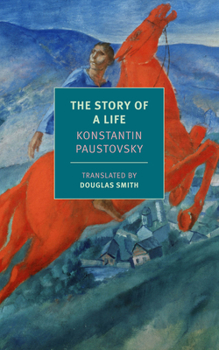Book Overview
One of the most famous works of Russian literature, a memoir about a writer's coming of age during World War I, the Russian Civil War, and the rise of the Soviet era. This is the first unabridged translation of the first three books of Konstantin Paustovsky's magnum opus. In 1943, the Soviet author Konstantin Paustovsky started out on what would prove a masterwork, The Story of a Life, a grand, novelistic memoir of a life spent...
Format:Paperback
Language:English
ISBN:1681377225
ISBN13:9781681377223
Release Date:February 2023
Publisher:New York Review of Books
Length:816 Pages
Weight:1.65 lbs.
Dimensions:1.7" x 5.3" x 7.9"
Customer Reviews
4 ratings
Paustovsky Is Great Unknown Author.
Published by Thriftbooks.com User , 14 years ago
I married a woman from the Ukraine and one of her friends suggested I read Konstantin Paustovsky. Being as I had never heard of him and knew virtually nothing about the Ukraine etc, my curiosity got the best of me and I purchased this book. Actually I loved it so much that I simply couldn't put it down until I was finished. It will enlighten anyone on the Ukrainian culture and their difficulties during their revolution. Great reading.I hope this helps.
Holy Mother Russia
Published by Thriftbooks.com User , 15 years ago
A labor of love by a greatly talented, highly professional wordsmith who, surviving much and seeing much during "interesting times," wished to recapture his past, beginning with his childhood (when Tolstoi and Chekhov yet lived) to the early years of the civil war in 20c Russia. As a writer he brilliantly paints the primordial lanscapes of Russia and the Ukraine, and the offerings of Kiev before the Fall. As a writer he excels in vivid, brief portraiture worthy of his great masters, Gogol and Dickens and Dumas. Yes, the recapitulations are often romantic, but they are wonderfully drawn. This is not the aristocratic introspections of Biely's St Petersburg or the leisurely, extended portraitures of Proust's sexually panicked world or the desperate wit (between the tears) of the exiled Nabokov. Paust. stands completely outside 20c western and middle European literature; his acknowledged masters are Chekhov, Turgenev, Stendhal, Maupassant. (It were interesting to contrast Paus.'s work with the classic tradition in American literature--that is, with the grim adumbrations of Hawthorne, Melville, Twain, Eliot, P Roth, O'Hara, Frost, Faulkner, Cheever.) An excellent translation--easy, clear, supple. This is not a point of view available to us who grew up in the '50s and '60s. By the way, the last quarter of the book now seems prophetic in its depiction of the greed and chaos and ugly tribalism that befell the Russia of the czars in the face of revolution. All now is as foretold then. The writer as prophet! In this regard, read Joseph Conrad's political essays on Russia written before the Great War. He too had foreseen a devolution to Hobbes's state of nature (not Rousseau's)--a delimma of such times: first comes anarchy, then tyranny. Hobbes's Leviathan would appear in the guise of an ex-seminarian from Georgia. The final chapters in Kiev and Odessa, in their evocative precision and brilliance, offer visuals worthy of Eisenstein and Griffith (the former's acknowledged master) and Bruegel; and, in the achieved horror of mere language, of Dante and N West and Isaac Babel as he lay coughing in Grandma's apartment in Odessa.
Paustovski is a master in describing people and nature
Published by Thriftbooks.com User , 25 years ago
What a great - and relatively unknown - writer Konstantin Paustovski is. I read the first part of this six part autobiography in de second year of my history studies, and it made me decide to switch from American to Russian history. In his books Paustovski proves to be an absolute master in describing people and nature. The characters he portrais are so vidid (and most of the time a bit weird)that the reader has no problem whatsoever in evoking a picture of them in his mind. And the way he paints pictures of nature with words is even more impressive. You can almost smell the flowers, see the trees waving in the wind, or hear the Wolga roar. Furthermore, these books are absolute must-reads for anyone who is interested in the early history of the Soviet Union. They give a great inside to how people percieved this turbulent period. All in all, Paustovski's autibiography is a cracker, wich will change your view on the ordinary things of live. All the people who ever borrowed one of my copies, were addicted the moment the read it and read the whole series afterwards.If you can lay your hands on a copy (secondhand?), don't hesitate and buy it!
very moving lifestory of a writer in Russia
Published by Thriftbooks.com User , 25 years ago
I read this sequel of books in the dutch translation of Wim Hartog. Part of the enjoyment of these books lie in the beautiful translation. The story is the autobiography of Paustovsky, who later in his life wrote about his earlier life before, during and after the russian revolution. The descriptions of places and persons are wonderful. Also Paustovsky tells a lot about the way he writes and how he views the books he has read. Beside the story of his life Paustovsky wrote a lot of other books. The books so far translated in Dutch are unfortunately less interesting than his lifestory.




